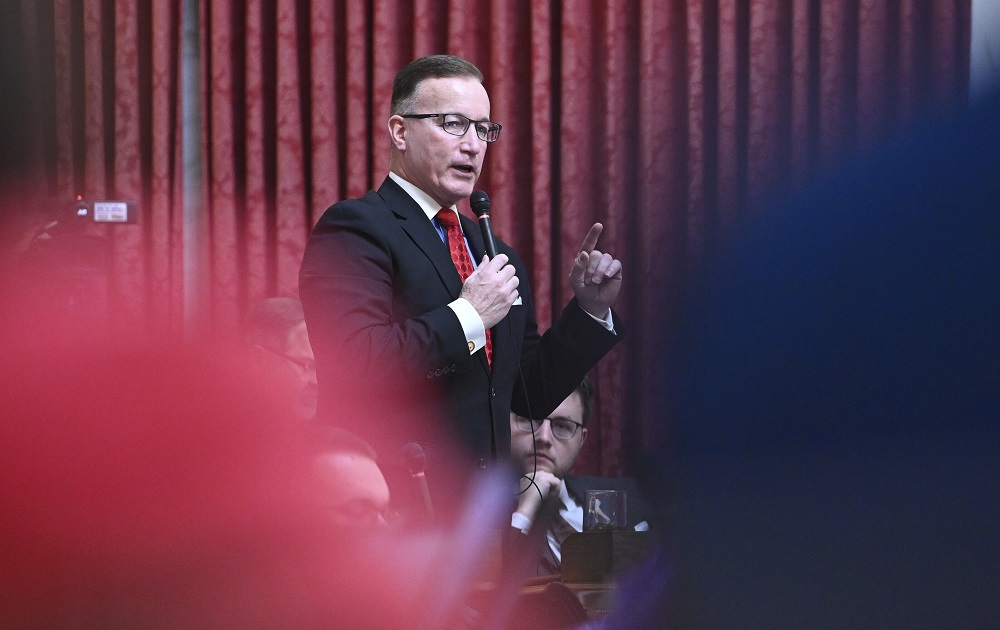CHARLESTON, W.Va. (AP) — A bill that would allow people with concealed carry permits to bring firearms on West Virginia public college and university campuses is heading to the desk of Republican Gov. Jim Justice after passing the final hurdle in the GOP-dominated Legislature.
The state House of Delegates voted overwhelmingly in favor of the legislation Tuesday. Justice has not said publicly whether he will sign the bill, passed last month by the Senate, where half of the entire chamber — all Republicans — were listed as sponsors.
At the House session, a lawmaker who supported the measure shared an emotional story about responding to the 2007 shooting at Virginia Tech as a state trooper.
Republican Del. Mike Honaker, who represents a county near the Virginia border, said he will never forget the sight of the blood that covered the floor of Norris Hall, nor the sound of cell phones ringing as people frantically tried to reach loved ones who could not answer.
Honaker and other officers were responsible for the harrowing task of notifying parents their children had been killed. The massacre, in which 32 people were killed, remains the deadliest school shooting in U.S. history.
"Please hear me: Years ago, I sat on the foot of my bed with Windex and paper towels and I washed the blood of almost 30 kids off of my shoes because of an active shooter on a college campus," he said.
"I fear that if I do not support this legislation, and it happens again, washing their blood off my shoes will not compare to trying to wash the blood off of my hands," he continued.
The bill strictly prohibits the open carry of a firearm on a college or university campus and allows institutions of higher learning to implement exceptions. It also prohibits people from bringing guns into areas with a capacity of more than 1,000 spectators — stadiums for football games, for example — or to on-campus daycare centers.
Similar legislation has already passed in 11 other states, including Arkansas, Colorado, Georgia, Idaho, Kansas and Oregon. If signed into law, West Virginia's bill would go into effect in July 2024.
Honaker said he understands the concerns of people opposed to the bill, but that he feels people should have the right to defend themselves. He said he hopes no one at a West Virginia college or university ever has to.
"What makes this issue even more weighty for me is this isn't just a policy issue, even though it is a policy issue," he said. "What makes it even more weighty is it is in fact a constitutional issue. We cannot escape that."
As the bill moved through the legislative process, the presidents of West Virginia's largest institutions of higher learning urged lawmakers to reconsider. They said decisions about whether or not to allow guns on campus should be left to the institutions to decide and voiced concerns about students struggling with mental health challenges.
Before the legislation advanced to the House floor, around 40 people — many of them West Virginia higher education students or faculty members — came to speak at a public hearing against the proposal last week. The two people who spoke in support both represented organizations that advocate for gun-owner rights.
Republican Del. Larry Kump said Tuesday he's heard critics of the bill say as Republicans, he and his colleagues should support the university's right to local control. He said the best local control is the individual rights protected under the U.S. Constitution.
"The Second Amendment is my gun permit and that's all I have to say about that," he said.
But Minority Leader Doug Skaff said lawmakers should be spending more time and attention on legislation to provide mental health support to university students — not guns. He said he's introduced legislation to help address the mental health of higher education students and "it hasn't seen the light of day."
"Just because we have a supermajority here, just because you can pass whatever you want, doesn't mean you should," he said.
Democratic Del. John Williams said people carrying guns on campus with good intentions could make law enforcements' work more difficult. He said it takes a lot of training to respond to and de-escalate a violent situation involving a deadly weapon, something most college students don't have.
"A false assumption that I think we're making is that every single one of these folks that's going to be carrying a gun on campus is going to be Clint Eastwood, ready to fight," he said.
The bill would allow exceptions in rooms where a student or employee disciplinary proceeding is being held, and says guns can be restricted in specifically designated areas where patient care or mental health counseling is being provided.
Schools would be permitted to regulate firearms in residence halls, but not in common areas, including lounges, dining areas and study areas. The bill requires colleges and universities to provide a secure location for storage of a pistol or revolver in at least one on-campus residence hall — or to make safes available in residence rooms, which could come with a fee.
